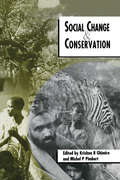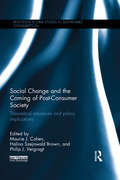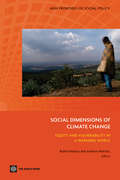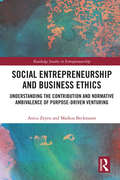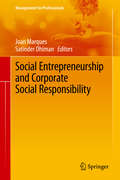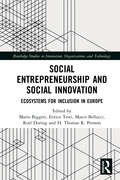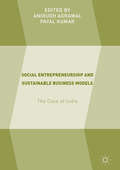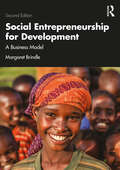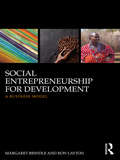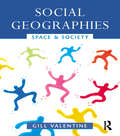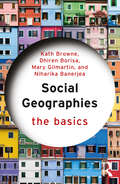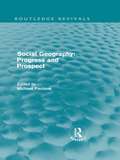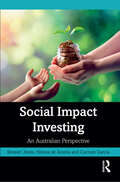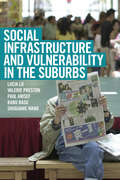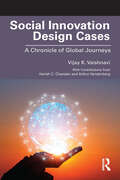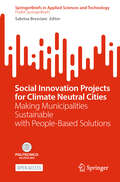- Table View
- List View
Social Change and Conservation (Earthscan Library Collection: Sustainable Development Set Ser.)
by Krishna B. Ghimire Michel P. PimbertProtected areas and conservation policies ore usually established with only local nature and wildlife in mind. Yet they con have far reaching consequences for local populations, often undermining their access to resources and their livelihoods. This book is the first comprehensive discussion of the social consequences of protected area schemes and conservation policies. Drawing on case studies from North America, Europe, Asia, Central America and Africa, it critically reviews current trends in protected area management, and shows how local people have been affected in terms of their customary rights, livelihoods, wellbeing and social cohesion. The loss of secure livelihoods ultimately threatens conservation, as poverty and environmental degradation intensify in and around protected areas. The leading authorities who have contributed to this ground breaking volume argue for a thorough overhaul of conservation thinking and practice.
Social Change and the Coming of Post-consumer Society: Theoretical Advances and Policy Implications (Routledge-SCORAI Studies in Sustainable Consumption)
by Maurie J Cohen Halina Szejnwald Brown Philip J VergragtConsumer society is an unquestionably complex social construct. However, after decades of unremitting dominance there are signs emerging that it is starting to falter, both as a coherent and durable system of social organization and as a strategy for societal advancement. Debates concerning how we can transition beyond present energy- and materials-intensive consumer society are beginning to gain greater salience. Social Change and the Coming of Post-Consumer Society aims to develop more complete appreciation of the relevant processes of social change and to identify effective interventions that could enable a transition to supersede consumer society. Bringing together leading interdisciplinary experts on social change, the book identifies and analyzes several ongoing small- and modest-scale social experiments. Possibilities for macro-scale change from the interlinked perspectives of culture, economics, finance, and governance are then explored. These contributions expose the systemic problems that are emblematic of the current condition of consumer society, specifically the unsustainability of prevailing consumption practices and lifestyles and the persistence of inequalities. These observations are summarized and extended in the final chapter of the book. This volume will be of great interest to students and scholars of sustainable consumption, sustainability transitions, environmental sociology, and sustainable development.
Social Change in South East Asia: New Perspectives
by Niels Fold Jacques Hersh Johannes Dragsbaek SchmidtProvides a comprehensive and in-depth examination of the ongoing process of development and societal transformation in a dynamic region of the Third World. Written by a team of specialists from the fields of development studies, sociology and political economy, the book looks at some of the fundamental problems facing South East Asia by addressing the following issues: the social constellations; class, culture and political legitimation; and industrialisation and labour regulation.
Social Dimensions of Climate Change: Equity and Vulnerability in a Warming World
by Andrew Norton Robin MearnsClimate change is arguably the most profound challenge facing the international community in the 21st century. It is as much a challenge for poverty reduction, growth and development as it is a global environmental issue. It could undermine or reverse progress in reducing poverty and attaining the Millennium Development Goals, thereby unraveling many of the development gains of recent decades. It already threatens the livelihoods, health and well-being of millions of people worldwide, and of the poorest and most vulnerable groups in particular. And it has potentially far-reaching implications for international relations and for personal, national and regional security. While significant uncertainties still remain, tremendous strides have been made over recent years in improving scientific understanding of the human processes driving global climate change and the likely impacts on world ecosystems. What is much less well understood is how these dynamics in the physical environment will interact with those of socio-economic systems, what the consequences will be for society, and how best to address them. In order to focus attention on these previously neglected and poorly understood social dimensions of climate change, the World Bank convened an international workshop in March, 2008, with the participation of community activists, former heads of state, leaders of Indigenous Peoples, representatives of non-governmental organizations, international researchers, and staff of the World Bank and other international development agencies. This edited volume brings together revised versions of many of the papers presented during that workshop, as an initial step in taking stock of existing knowledge on the social dimensions of climate change. Several new papers were also commissioned for this volume.
Social Dimensions of the IMF's Policy Dialogue
by International Monetary FundA report from the International Monetary Fund.
Social Ecology
by Marina Fischer-Kowalski Helmut Haberl Fridolin Krausmann Verena WiniwarterThis book presents the current state of the art in Social Ecology as practiced by the Vienna School of Social Ecology, globally one of the main research groups in this field. As a significant contribution to the growing literature on interdisciplinary sustainability studies, the book introduces the purpose and nature of Social Ecology and then places the "Vienna School" within the broader context of socio-ecological and other interdisciplinary environmental approaches. The conceptual and methodological foundations of Social Ecology are discussed in detail, allowing the reader to obtain a broad overview of current socio-ecological thinking. Issues covered include socio-metabolic transitions, socio-ecological approaches to land use, the relation between actor-centered and system approaches, a socio-ecological theory of labor and the importance of legacies, as conceived in Environmental History and in Long-Term Socio-Ecological Research. To underpin this overview empirically, the strengths of socio-ecological research are elucidated in cases of cutting-edge research, introducing a variety of themes the Vienna School has been tackling empirically over the past years. Given how the field is presented - reflecting research carried out on different scales, reaching from local to global as well as from past to present and future - and due to the way the book is structured, it is suitable for classroom use, as a primer, and also as an overview of how Social Ecology evolved, right up to its current research frontiers.
Social Enterprise in China (Routledge Studies in Management, Organizations and Society)
by Benedicte BrøggerThis book explores social innovation and entrepreneurship in China. Focusing on selected social enterprises and processes, it addresses the question of "why China?", not in terms of military, economic or political ambitions, but in the terms of social innovation and welfare policies. The analyses range from detailed ethnography to discussions of broad global trends. Despite vastly improved social conditions in the country, there are still unresolved issues that social enterprises address. The study elaborates on the complexities involved in their positioning between the state and their beneficiaries. Adding to the complexity is China’s dual system of circulation and the moral economy of ethnic minorities. The theoretical foundation of the study is the Durkheimian concept of the social contract. Its content is viewed as comprised of Maussian total social facts or guanxi, a similar Chinese framing, operationalised to particular socio-cultural configurations. The empirical cases document how social enterprises reposition elements in the various configurations in order to mobilise resources from their stakeholders. The book concludes that the discursive topology is altered in the process and the social contract is renewed in culturally meaningful, if paradoxical, ways. This book will be of interest to researchers, students and academics in the fields of business and social entrepreneurship, especially to those with a particular interest in the Chinese case.
Social Entrepreneurship and Business Ethics: Understanding the Contribution and Normative Ambivalence of Purpose-driven Venturing (Routledge Studies in Entrepreneurship)
by Anica Zeyen Markus BeckmannSocial entrepreneurs are change makers that aim to solve society’s unsolved problems. Not surprisingly, social entrepreneurship has thus created high expectations. To better understand the potential as well as the limitations of social entrepreneurship, however, a more nuanced approach is needed in two ways. First, social entrepreneurship is a multi-level phenomenon. It spans macro-level questions as well as meso-level questions and, finally, micro-level questions. If we really want to understand social entrepreneurship, we need to bring together all three levels of analysis and see how they are connected. Second, while social entrepreneurship can certainly produce socially desirable outcomes, we also need a critical perspective to capture potential undesirable effects that social entrepreneurship can cause, often unintendedly, in society, in markets, in organizations, and for individuals. To this end, an ethical perspective can help complement the positive analysis of social entrepreneurship with a discussion of the normative implications of its potential "dark side". Looking at social entrepreneurship from both a multi-level analysis and an ethical perspective, Social Entrepreneurship and Business Ethics takes the reader on a journey through the "bright side" as well as the potential "dark side" of social entrepreneurship for societies, organizations, and individuals. Highlighting both, this book not only seeks to provoke researchers and students to advance their understanding of social entrepreneurship. It also hopes to help practitioners to better realize the positive contributions of social entrepreneurship for society.
Social Entrepreneurship and Corporate Social Responsibility (Management for Professionals)
by Satinder Dhiman Joan MarquesThis book provides professionals, as well as students, with the understanding that Social Entrepreneurship and Corporate Social Responsibility (CSR) are now core business principles for sustainably. It encourages social entrepreneurs in their role as forerunners, in creating new business models that develop, facilitate or implement constructive solutions to social, cultural and environmental issues. At the same time, this book views corporate social responsibility as a means of challenging existing entities to realize and modify prior unsustainable and predatory business models; and to increase social, cultural and environmental accountability. By linking these two concepts, this book prompts a paradigmatic awakening, whereby the foundational driver of business creation and management no longer rests on profit maximization, but on improvement of the quality of life for society.
Social Entrepreneurship and Social Innovation: Ecosystems for Inclusion in Europe (Routledge Studies in Innovation, Organizations and Technology)
by Mario Biggeri Enrico Testi Roel During Marco Bellucci H. Thomas PerssonThis book provides comprehensive and advanced analysis of the characteristics of social entrepreneurship in Europe. It offers innovative, up-todate research on the ecosystems of social entrepreneurship, the behavior of social entrepreneurs, their ability to produce social innovation, social capital and social inclusion, and the role of stakeholders in fostering socially oriented businesses. Moreover, it addresses the diversity of the European social enterprise sector from an evolutionary perspective, with particular reference to the rise of social entrepreneurship and the role of new-generation social entrepreneurs throughout Europe. Multidisciplinary contributions authored by experts from business and accounting, economics, and sociology serve the purpose of delivering a holistic study of social entrepreneurship, also providing the necessary data for delivering policy implications on the features of the most effective enabling social and institutional ecosystems. The broad approach, based on different theoretical frameworks and methodologies across numerous disciplines, enables the authors to tackle all of the complex research issues connected to social entrepreneurship in the region. The book builds on the results of the European Union 7FP (European Union’s Research and Innovation funding program for 2007–013)-funded “EFESEIIS – Enabling the flourishing and evolution of social entrepreneurship for innovative and inclusive societies” research project. The central theme of the book is an evolutionary perspective on the dynamics and the rise of the social enterprise in Europe. This evolutionary perspective can be used in an economic as well as a social longitudinal analysis of changing contexts and entrepreneurial practices. The evolutionary perspective will be used as a tool to account for the specificity of developmental pathways in different contexts and countries.
Social Entrepreneurship and Sustainable Business Models: The Case Of India
by Payal Kumar Anirudh AgrawalAddressing the need for further theorisation and operationalisation of social entrepreneurship in India, this edited collection provides a critical and deeper understanding of the social entrepreneurial ecosystem. Covering topics such as entrepreneurial intentions, empathy, impact investment and standardised social measures, the contributors explore the potential of social entrepreneurship and sustainable business models in an Indian context. Offering empirical cases and presenting a realistic perspective of the social entrepreneurship landscape in India, this collection will undoubtedly be of value to those interested in creating a social and sustainable impact in business and society.
Social Entrepreneurship and Sustainable Development (Towards Sustainable Futures)
by Archana Singh Edakkandi Meethal RejiThis volume discusses the seminal interface between social entrepreneurship and sustainable development along with their inter-linkages. It traces the role of social entrepreneurship and innovations in societal transformation in creating sustainable societies, especially in developing nations. It explores how social entrepreneurship and enterprise is integral to the promise of fostering opportunities for socially disadvantaged groups (including the poor, women, and young people), as well as in addressing environmental and ecological issues apart from wealth creation. The book presents key concepts, case studies, and multiple innovative models involving social entrepreneurship, such as green financing, serial social entrepreneurship, sustainable livelihood creation, and well-being, in addition to highlighting global sustainable development goals of the United Nations. The chapters are organised under the broad themes of sustainability of the organisation, sustainability of the community, sustainability of the development, and sustainability of the community–organisation interface. They examine social change, social innovation, social enterprise, small and micro-enterprises, microfinance institutions, inclusive growth, education, productivity, physical health, waste management, energy retention, self-reliance, and corporate social responsibility. They contain emerging research issues in the field as well as critical assessments while bringing together theoretical and practitioners’ perspectives. This book will be useful to scholars and researchers of development studies, social entrepreneurship, sustainable development, environmental studies, public policy, and political sociology. It will also greatly interest professionals from non-profit, corporate, and public sectors, other development practitioners, and international bodies.
Social Entrepreneurship for Development: A Business Model
by Margaret BrindleSocial Entrepreneurship for Development, Second Edition, presents a fresh approach to poverty alleviation by bridging the fields of international development and social entrepreneurship. The authors present a six-step model for developing an IP business positioning strategy that allows developing country producers to position themselves better as owners of retail brands in foreign market countries. Readers will learn how producers can control the supply chain, including distribution to retail stores.Focusing on Africa and least developed countries (LDCs), the authors demonstrate methods of utilizing intellectual property tools, producer ownership, market positioning, and branding for lucrative outcomes. Extensive research provides readers with a thorough understanding of what it means to work smarter in a developing business, while a rich set of international cases offers insight into the practical applications of brand positioning, trademarks, and licenses. This new edition features brand new chapters on funding and environmental, social, and government goals (ESGs).With a dozen online workbooks to outline methodology, skills, tools, and case studies, Social Entrepreneurship for Development, Second Edition, remains a valuable resource for any student of social entrepreneurship or international development.
Social Entrepreneurship for Development: A business model
by Margaret Brindle Ron LaytonThis book presents a fresh approach to poverty alleviation by bridging the fields of international development and social entrepreneurship. The authors present a six-step model for developing an IP business positioning strategy that allows developing country producers to position themselves better as owners of retail brands in foreign market countries. Readers will learn how producers can control the supply chain, including distribution to retail stores. Focusing on Africa and least developed countries (LDCs), the authors demonstrate methods of utilizing intellectual property tools, producer ownership, market positioning, and branding for lucrative outcomes. Extensive research provides readers with a thorough understanding of what it means to work smarter in a developing business, while a rich set of international cases offers insight into the practical applications of brand positioning, trademarks, and licenses. With a dozen online workbooks to outline methodology, skills, tools, and case studies, Social Entrepreneurship for Development will be a valuable resource for any student of social entrepreneurship or international development.
Social Entrepreneurship in Sport: How Sport Can Deliver Social Wellbeing
by Vanessa RattenThe social role of sport enterprises is being increasingly recognized at both local and global levels. Sport has the ability to influence community cohesion, physical and mental health, social inclusivity, and provides positive role models across society. More businesses in sport are incorporating these social aspects into their plans as a way of differentiating themselves from their competitors. This, in turn, has led to more social innovation in sport. Recently, there has been more emphasis on social entrepreneurship in sport due to the growing need to capture its societal impact. This book explores the non-profit role sport plays in society, and demonstrates how social enterprises can both address some of the negative social outcomes of sport and support businesses as they develop their social objectives. The over-arching aim of the book is to focus on how social entrepreneurship in sport is important in developing a better global society.
Social Geographies: From Difference to Action (Wiley Blackwell Companions To Geography Ser. #19)
by Ruth PanelliHow do we describe ourselves? Where have we, do we, will we, live our lives? Why are the differences between people a source of tension? How can social change occur? Social geography can assist in addressing these questions. It provides ways of understanding and living in our contemporary world. Providing students with the resources to understand both the theoretical and empirical approaches social geographers take when investigating social difference, this text outlines key theoretical approaches and traces the core geographies of difference: class, gender, race/ethnicity, and sexuality. It concludes by showing how geographers work across these ideas of difference to understand questions of identity, power and action. Using illustrative examples from around the world, Social Geographies includes: - Individual chapters on the main theoretical approaches to difference - Individual chapters on the key concepts of identity, power and action - Reviews of the core literature, with suggestions for further reading - Biographies of key contemporary social geographers - Glossary of key terms For students beginning human geography courses, or in social geography modules, this book is the essential primer.
Social Geographies: Space and Society
by Gill ValentineMost social geography undergraduate textbooks are structured around different social categories, splintering the discussion of gender, class, race and increasingly now sexuality and disability, into separate chapters. This has the effect, firstly, of making social relations rather than space (the raison d'etre of human geography) the focus of undergraduate books; secondly of ignoring the way that social relations are negotiated and contested in different space. Rather than reproducing this conventional social geography format the aim of this proposed text is to make space the focus of analysis. In doing so the intention is to make complex theoretical debates about space more accessible to students and encourage them to look at their own environments in new ways.
Social Geographies: The Basics (The Basics)
by Mary Gilmartin Kath Browne Niharika Banerjea Dhiren BorisaSocial Geographies: The Basics introduces what social geography is, and what it might be. It outlines the key contours of social geographies, and also disrupts some of the conventions of the discipline in both its content and structure.This book approaches social geographies by beginning with the resistances, contestations and ‘solutions’ that communities use to challenge exclusions in place and space in order to create equitable societies. It then addresses the inequalities, precarities, and ‘problems’ that prompt these interventions. This allows the book to emphasise the importance of activism in the here and now, and to show how activism often makes issues visible and contested in ways that are then theorised by academics. Social Geographies starts with solidarities, communities, and networks before moving to examine difference, precarity, and mobilities. Each chapter offers key case studies that centre resistance, contestations of inequitable power, and local knowledges that can often be seen as ‘solutions’ to national and transnational issues, creating a decolonial understanding of ‘social geography from below’ within and across national contexts.This book is essential reading for undergraduate students and readers new to the area, as well as anyone studying introductory geography, social, cultural and critical geography, ‘the spatial turn’ and issues of spatialities, and key issues like precarity, power, difference, equality, and mobilities.
Social Geography: Progress and Prospect (Routledge Revivals)
by Michael PacioneThe examination of social questions is a relatively new development in goegraphy, but social geography has now blossomed into a fully fledged sub-discipline which has in fact influenced significantly all other areas of geography. This book, first published in 1987, presents an overview of recent developments in all the major branches of social geography. As such it provides a valuable introduction to te subject, a review of the latest state of the art and a pointer to future research directions.
Social Impact Investing: An Australian Perspective
by Carmen Garcia Stewart Jones Helena de AnstissSocial impact investing is gaining ground as one of the most important investment trends in the world. While the size of the social impact investing market is still relatively small in global terms, momentum continues to grow unabated. Australia in particular is looking to develop a vibrant and transparent social impact investment market. This book considers a number of innovative strategies and pragmatic policy initiatives that can see the social impact investment market flourish in Australia and internationally. The book describes how social impact investing can enter the investment mainstream and how a high-quality regulatory framework governing the measurement, reporting and evaluation of social impact will be critical to building investor confidence and ensuring the credibility, effectiveness and transparency of this market. It also examines different approaches to measurement and evaluation that will ultimately be critical to the success of this market. The authors also recognise that governments have a pivotal role to play in growing the social impact investing market, not only in its capacity as a market facilitator and regulator but also as an active purchaser of social outcomes. This book will be informative for those who wish to learn more about how governments, private investors, investment intermediaries, social enterprises, service providers and other market participants around the world can work together to initiate and grow a vibrant, transparent and well-functioning social impact investing market.
Social Impact Measurement for a Sustainable Future: The Power of Aesthetics and Practical Implications
by Claire Paterson-Young Richard HazenbergThis book explores the history of social impact measurement, offering justifications for the use of social impact measurement in modern society. It seeks to uncover the tensions inherent in social impact measurement, especially between creating and measuring social value creation. As the world becomes ever more globalised in its focus to deliver sustainable solutions to social and environmental problems, frameworks such as the United Nation’s Sustainable Development Goals (SDGs) provide basic structure through which social impact can be assessed and compared globally. Nevertheless, constructive critiques of such approaches are required to ensure that they do not misinform stakeholders, disenfranchise the disadvantaged and exacerbate existing social problems. In providing this overview, the book seeks to offer a critical review of the social impact measurement field centred on concepts of ‘empowerment’ and ‘social action’ (Weber, 1978), whilst also demonstrating best practice and potential pitfalls to policymakers and practitioners.
Social Infrastructure Maintenance Notebook
by Yu Huang Atsushi YashimaThis book explains in an easy-to-understand manner the “check” points to keep in mind when inspecting various social infrastructure structures. It is put together in a way that not only engineers who are on the front line of maintenance and management but also engineers who are not normally involved in maintenance and management of social infrastructures as well as general public can understand the importance of social infrastructure inspection work.
Social Infrastructure and Vulnerability in the Suburbs
by Valerie Preston Paul Anisef Lucia Lo Shuguang Wang Ranu BasuSocial Infrastructure and Vulnerability in the Suburbs examines how the combination of the low-density, car-centric geography of outer suburbs and neoliberal governance in the past several decades has affected disadvantaged populations in North American metro areas. Taking the example of York Region, a large outer suburb north of Toronto, the authors provide a spatial analysis that illuminates the invisible geography of vulnerability in the region.The volume examines access to social services by vulnerable groups who are not usually associated with the suburbs: recent immigrants, seniors, and low-income families. Investigating their access to four types of social infrastructure - education, employment, housing, and settlement services - this book presents a range of policy recommendations for how to address the social inequalities that characterize contemporary outer suburbs.
Social Innovation Design Cases: A Chronicle of Global Journeys
by Vijay K. VaishnaviSocial innovation is an innovation whose main aim is to benefit society. There is a worldwide need for and interest in conducting innovations and social innovations. Social Innovation Design Cases: A Chronicle of Global Journeys provides an in-depth description of the design journeys of twenty social innovation cases from twelve countries around the globe on five continents. The design cases span areas ranging from promoting rural economic development to addressing climate change. The book describes in depth, citing relevant references, the design journeys of the twenty social innovations and corresponding social enterprises, following an innovation design process model. Additionally, it describes the knowledge models and metamodels contributed by these cases. Each design case presents the overall business model of the social innovation and the corresponding social enterprise.The book is for social entrepreneurs, innovators and aspiring innovators, especially those actively planning and designing social innovations in for-profit, government and not-for-profit organizations. In addition to managers, executives and mid-level staff, the book is for students and trainees who would like to understand different kinds of social innovations as well as their design and implementation. Providing details on the design and implementation of a variety of successful social innovations, the cases presented can serve as templates for future social innovations. The book can empower social entrepreneurs and innovators to develop and implement ideas for the betterment of society at large.
Social Innovation Projects for Climate Neutral Cities: Making Municipalities Sustainable with People-Based Solutions (SpringerBriefs in Applied Sciences and Technology)
by Sabrina BrescianiThis open access book examines the role of social innovation in cities as an important lever towards climate neutrality. Social innovations are people-centred collaborative solutions, activating the urban ecosystem for change and providing platforms for citizens, civic organizations, the private sector, and governmental institutions to collaborate towards the goal of reducing greenhouse gas (GHG) emissions. The book, based on work developed within the EU-funded project NetZeroCities, which aims to support over 100 European cities to be climate-neutral by 2030, outlines methods, cases, and pathways of social innovation in Europe. It presents social innovation design process pathways through methods, categories of actions, and related cases for developing and scaling social innovations at the urban level, contributing to a systemic approach to tackle the grand challenge of reaching net zero. Within these pages, researchers and policymakers can find examples of cities that have deployed innovative public administration practices by systemically embedding social innovation in varied fields of urban action plans, including energy, citizen engagement, and behavioural change for lowering carbon emissions and increasing well-being.
